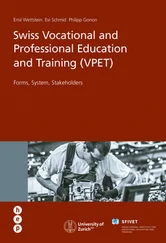
Ursula Renold, Franz Probst (Eds.)
The Swiss Vocational Education and Training Initiative India
Background, Concept and Results of the Pilot Project 2008–2013
ISBN 978-3-0355-0375-3
First Edition printed in 2016
All rights reserved
© 2016 hep verlag ag, Berne
www.hep-verlag.com
Table of contents
Foreword by the chairman of the Swiss Employers Confederation
Foreword by the president of Swissmem
Foreword by the chairman of NSDA and NSDC
Introduction by the editors
Part I A comparison of two education systems
Introduction
The Swiss education system, with a special focus on vocational education and training Maria Esther Egg and Ursula Renold
The Indian education system and the challenges of vocational education and training Ursula Renold and Vipul Agarwal
Part II Background, point of departure and guiding principles
Introduction
Vocational education and training in India – a Swiss development cooperation success story Richard Gerster
Dynamic development of Swiss-Indian bilateral economic relations Daniel Freihofer
The requirements of the Swiss machine and precision mechanics industry Contributions by companies
The situation in India before the start of the project in 2008 Franz Probst
Five guiding principles for introducing elements of the dual vocational education and training system in India Ursula Renold
Part III Innovative concept with a systemic approach
Introduction
Dual vocational education and training in a country without tradition of workplace training – the «role model concept» Ursula Renold
The role of the Swiss-Indian Chamber of Commerce (SICC) Franz Probst
Part IV The pilot projects in Pune and Bangalore 2008–2013
Introduction
2008 feasibility study José Oberson
Project organisation, planning and findings Franz Probst
Developing a need-based framework curriculum for polytechnicians Arthur W. Glättli and Peter Stössel
Training the teachers, VET trainers and examination experts Hanspeter Tanner and Martin Nydegger
India’s point of view – Interview with G. P. Chandra Kumar, Project Director India Franz Probst
Part V Proof of concept and conclusions
Introduction
Pilot project – Swiss Vocational Education and Training Initiative India – Evaluation Barbara Haering and Ladina Rageth
From a public-private project to a permanent partnership Franz Probst
Part VI Conclusions and authors
Editors’ concluding remarks
About the authors
Part VII Annexes
Memorandum of Understanding with State of Karnataka
Memorandum of Understanding with State of Maharashtra
Final diploma with marks card of multi-skilled production technician
Targets and achievements of the pilot project: Overview
List of abbreviations
List of figures
Foreword by the chairman of the Swiss Employers Confederation
«Learning for Jobs» is a cross-national comparative study of vocational education and training systems published by the OECD in 2010.[1] Many countries complain of high unemployment among the youth, or the complete lack of practical educational training oriented to meeting the demands of the employment market. Vocational education and training became the core challenge of many emerging economies in the 21 stcentury. While university education is well developed, and even very well developed for a small section of the population in most of these countries, there is a shortage of professionals with on-the-job training in almost every field. This grievance is not restricted to the local authorities or business representatives but is also the experience of Swiss companies operating their production plants in the corresponding countries. It was these organisations that articulated their needs to the former Federal Office for Professional Education and Technology (OPET) on the occasion of the 2007 Science Mission in India, and that finally gave the impetus to launch the pilot project.
The increasing international integration of the economy has translated into new challenges regarding qualifications in many countries. The challenges are varied in nature. In Switzerland, we have to improve intercultural competence and language development in the entire education system to ensure our young professionals are fit for the globalised economic environment. The emerging economies on the other hand must qualify their respective «pyramids of professionals in an organisation» if they want to be successfully involved in global economic growth. These emerging economies require highly qualified professionals over the entire spectrum of the talent scale to ensure economic growth, as well as to export their goods and services. While they usually have a very well-qualified workforce in the academic sense, they lack the practical skills. Swiss companies that cannot find any highly qualified technical professionals in the local employment market are particularly affected by this situation. Considering the regressive demographic development in Switzerland, they are also unable to simply rely on the domestic employment market for young professionals. Switzerland, as a high-price country with quality leadership in numerous products, therefore especially needs to develop its own initiatives. If the Swiss companies want to grow in the emerging economies and maintain their high quality at the same time, they require a workforce that is trained for the corresponding state-of-the-art technology and qualified for precision work.
The Swiss Vocational Education and Training Initiative India is a highly promising innovation that provides answers to the challenges of Swiss industry and to the challenges in the respective target country. The first apprentices have completed their training in India and the pilot project will be migrated to a sustainable form and expanded.
This approach is fundamentally different in comparison to the official Swiss vocational education and training activities that have been conducted to date until now. This is because Swiss industry is responsible for the transfer of training knowledge and not the government. As in Switzerland, the organisations in India should be able to define the content of education and training and play a significant role in specifying the qualification standards to be achieved. This ensures that the acquired qualifications really do match the needs and the technological standards of the companies. As Chairman of the Swiss Employers Confederation, and also as Chairman of the Board of Directors of Burckhardt Compression, an organisation that is participating in the development of dual vocational education and training in India, I emphatically support this initiative.
I hope that Swiss industry can satisfy its demand for highly qualified, practically trained professionals in the target markets with complete satisfaction and that many local young professionals will benefit from it and receive a high-quality professional perspective enabling them to enter the domestic and international employment market. If dual vocational education and training achieves more recognition internationally, this will also help Switzerland to raise the status of vocational education and training.
Swiss Employers Confederation
Valentin Vogt
Читать дальше













